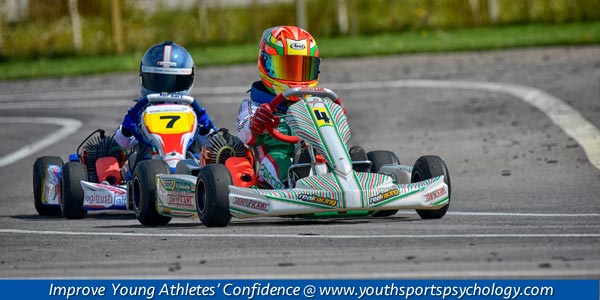How to Tell if Your Sports Kid is Ready For Mental Training
“Is my 9-year-old too young for mental training?” asks one sports parent.
It’s clear, she says, that her son has some mental game blocks.
“In practice he is one of the best players on his team, but his confidence in games is low—he seems very tentative and willing to let others do the work (out of) fear of failing.”
Our answer: Kids are never too young to be exposed to mental toughness training. What’s important is how you expose them…
When athletes are younger—between the ages of 5 and 10—it’s important to keep the concepts simple and easy to understand. Use terms your child can understand…
For example, if you were the parent of the 9-year-old above, you might begin by gently pointing out that he really rocks during practice, but seems a little scared during games.
Try to uncover what’s behind his fear. If you suspect he goes into his hockey game with high expectations, for example, ask him about this:
“Do you start the game telling yourself you’re going to score tons of goals?”
If he says yes, help him toss his expectations.
“I think you might get upset when you expect to score so many goals and don’t convert. That probably makes you play with less confidence. That’s a lot of pressure on yourself.”
There are many advantages to exposing kids to mental game training early on.
First, mental game issues will become part of athletes’ consciousness and vocabulary. They will integrate sports psychology concepts naturally into their learning. They’ll also realize earlier how important it is to have mental toughness.
In addition, when kids embrace mental game skills early on, they develop confidence. They learn strategies for keeping and enhancing that confidence–rather than simply reacting negatively when their performance is not perfect.
Mental game training also helps kids understand that they’re not “bad” or “losers” if they make mistakes or lose a game or competition. With some exposure to sports psychology early on, kids learn to not judge themselves based on their performance. You don’t want kids to label themselves as losers.
What’s more, when kids learn about the mental game of sports, it transfers to school and other aspects of their lives. For example, if they learn techniques for focusing well in sports, they can apply these strategies to test-taking, a piano recital or other activities.
As parents and coaches, you should focus on the numerous benefits of sports psychology. With some mental game training, athletes will improve their consistency, boost their confidence, improve their focus and learn how to practice smarter.
Remind your athletes that they’re not broken or dysfunctional if they choose to embrace mental training. They’re smart and more likely to gain a mental edge and beat out the competition!
Related Articles on Kids’ Mental Game:
- How to Explain Mental Training to Teens
- Mental Training Programs For Young Athletes
- How to Explain Mental Training to Young Athletes
*Subscribe to The Sports Psychology Podcast on iTunes
*Subscribe to The Sports Psychology Podcast on Spotify
Improve Your Mental Game From Anywhere In The World

We’re certain that, as a parent, you want to help your child develop confidence and discipline in sports and life. And as a sports parent, you’d love for your children to reach their potential in sports. But encouraging your child to strive for greatness without pressuring them can be a challenge.
You can get expert mental coaching with us from anywhere. Meet with us via Zoom, Skype, FaceTime or phone call. With today’s video technology, we are able to connect with athletes and coaches all over the globe.
Call Us Today to Schedule Your Free 15-Minute Session.
Find Out How Your Athlete Can Benefit From One-on-One Mental Coaching!

